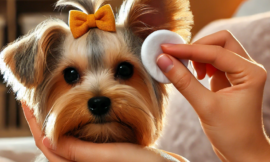Excessive scratching in Yorkshire Terriers is often a sign of an underlying skin issue. While occasional itching is normal, frequent scratching, biting, or licking can indicate allergies, infections, parasites, or dry skin. If left untreated, these issues can lead to hair loss, sores, and discomfort.
In this guide, we’ll explore the most common causes of skin problems in Yorkies, how to identify them, and the best treatments to keep their skin healthy.
Common Causes of Itching and Skin Problems in Yorkshire Terriers
1. Allergies (Environmental, Food, or Fleas)
Yorkies are prone to allergies, which can cause severe itching and irritation.
✔ Environmental allergies – Pollen, dust mites, grass, mold.
✔ Food allergies – Common culprits include chicken, beef, dairy, and grains.
✔ Flea allergy dermatitis – Even a single flea bite can cause intense itching.
🔍 Symptoms: Constant licking, red skin, ear infections, hair loss.
2. Dry Skin
Yorkies have delicate skin that can become dry due to:
✔ Frequent bathing with harsh shampoos.
✔ Cold weather or low humidity.
✔ Poor diet lacking essential fatty acids.
🔍 Symptoms: Flaky skin, excessive scratching, dandruff.
3. Parasites (Fleas, Ticks, and Mites)
Fleas and ticks cause intense itching, while mites (like mange) lead to hair loss and severe irritation.
🔍 Symptoms: Small red bumps, constant scratching, inflamed skin.
4. Fungal and Bacterial Infections
✔ Yeast infections – Often found in ears, paws, and skin folds, causing greasy or smelly skin.
✔ Bacterial infections – Can result from excessive scratching and lead to sores.
🔍 Symptoms: Bad odor, thickened skin, redness, and sores.
5. Contact Irritants
Certain grooming products, detergents, or fabrics can irritate your Yorkie’s skin.
🔍 Symptoms: Sudden itching after exposure to a new shampoo, cleaner, or bedding.
How to Treat and Prevent Skin Issues in Yorkies
1. For Allergies
✔ Use hypoallergenic dog food and eliminate common allergens.
✔ Clean paws after walks to remove pollen and irritants.
✔ Give Omega-3 supplements to support skin health.
2. For Dry Skin
✔ Use a moisturizing shampoo with oatmeal or aloe vera.
✔ Brush regularly to distribute natural oils.
✔ Avoid bathing too often (every 3–4 weeks is ideal).
3. For Parasites
✔ Use monthly flea and tick preventatives.
✔ Wash bedding frequently and vacuum carpets.
✔ Consult a vet for mites or persistent infestations.
4. For Infections
✔ Clean affected areas with vet-recommended wipes.
✔ Use antifungal or antibacterial shampoos as prescribed.
✔ See a vet if symptoms persist or worsen.
5. For Contact Irritants
✔ Switch to fragrance-free, gentle grooming products.
✔ Rinse thoroughly after baths to remove shampoo residue.
✔ Wash bedding with hypoallergenic detergent.
When to See a Vet
🚨 Excessive itching that doesn’t improve with basic care.
🚨 Red, inflamed, or bleeding skin.
🚨 Hair loss, bald patches, or scabs.
🚨 Signs of pain, lethargy, or behavioral changes.
Understanding the cause of your Yorkie’s scratching is the key to effective treatment and prevention. With proper skin care, diet, and grooming habits, your Yorkie can stay itch-free and comfortable. 🐶✨





